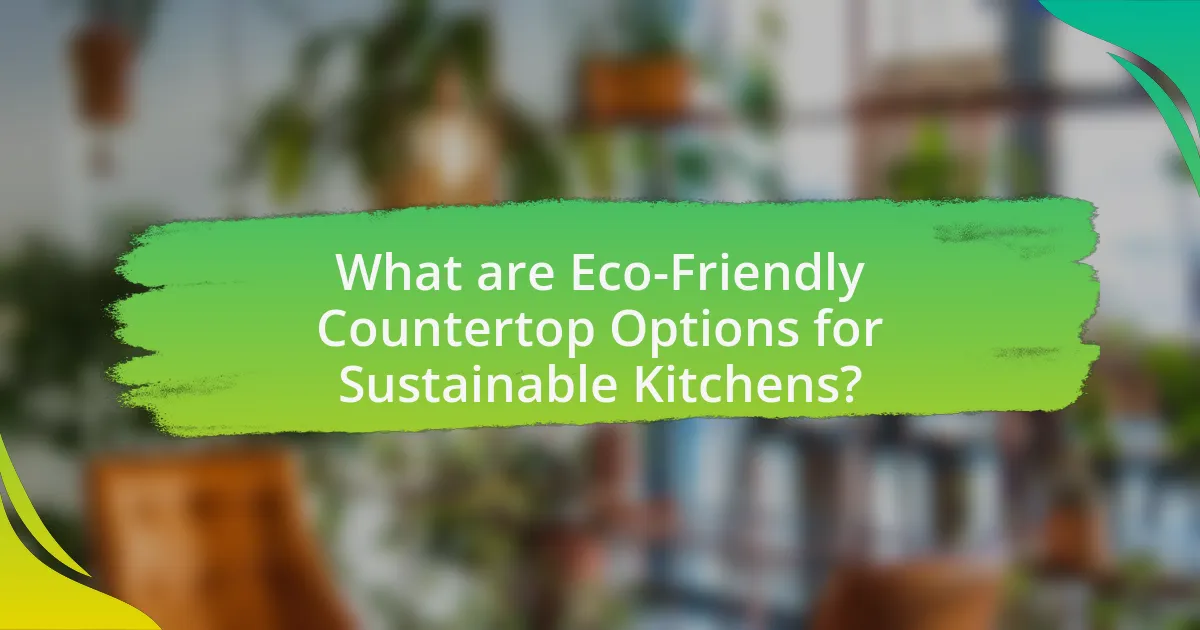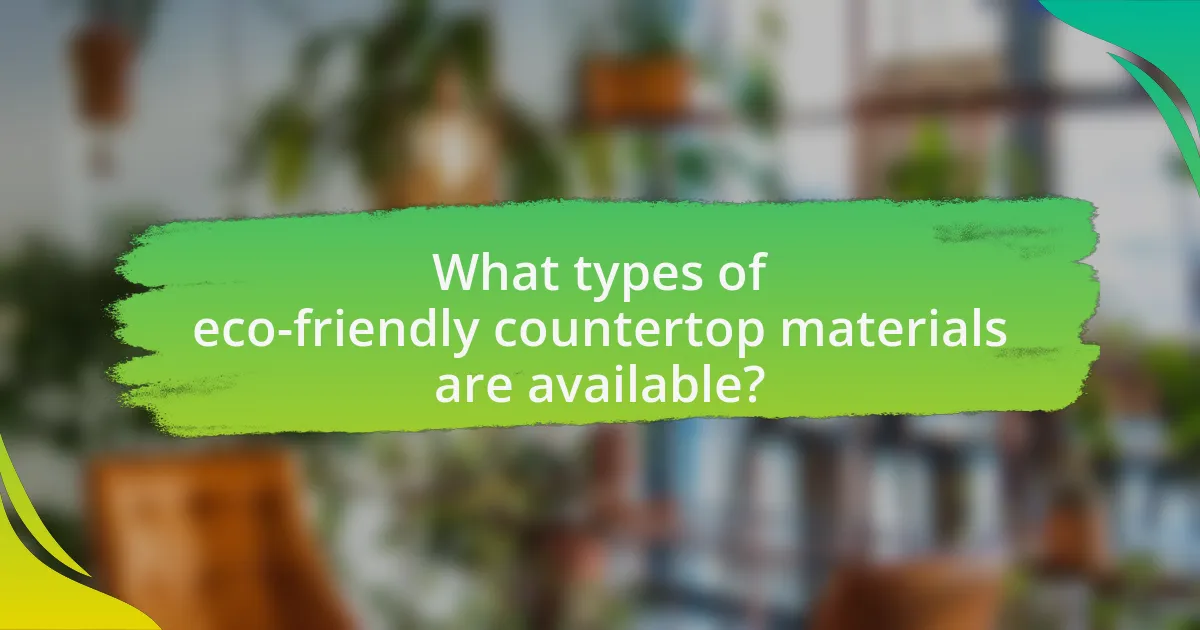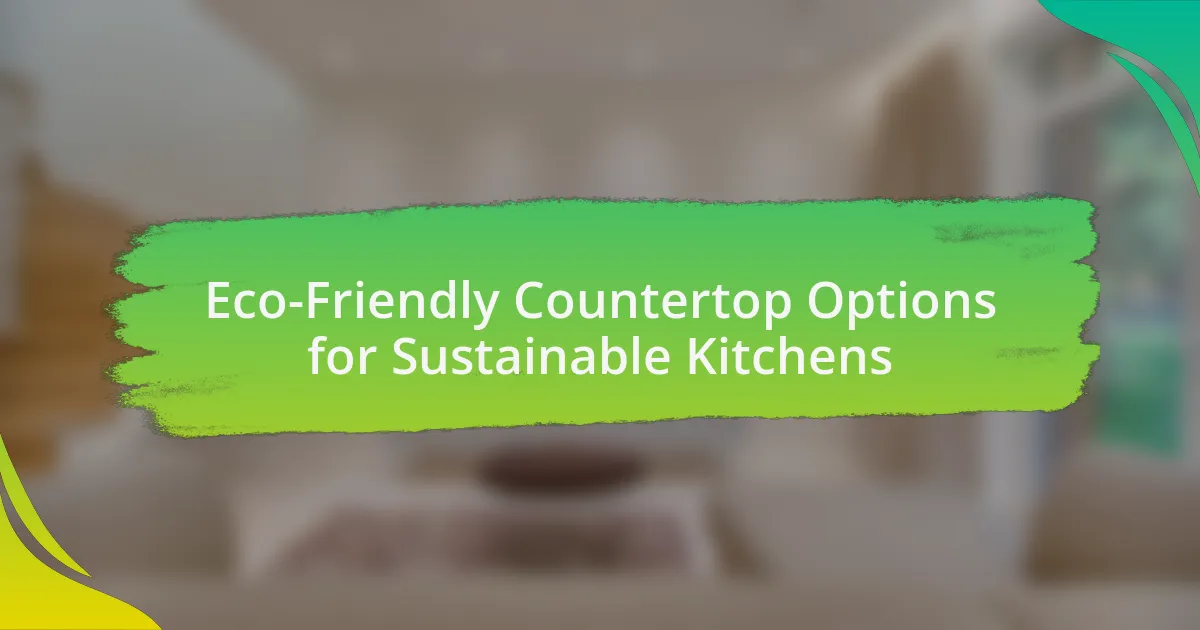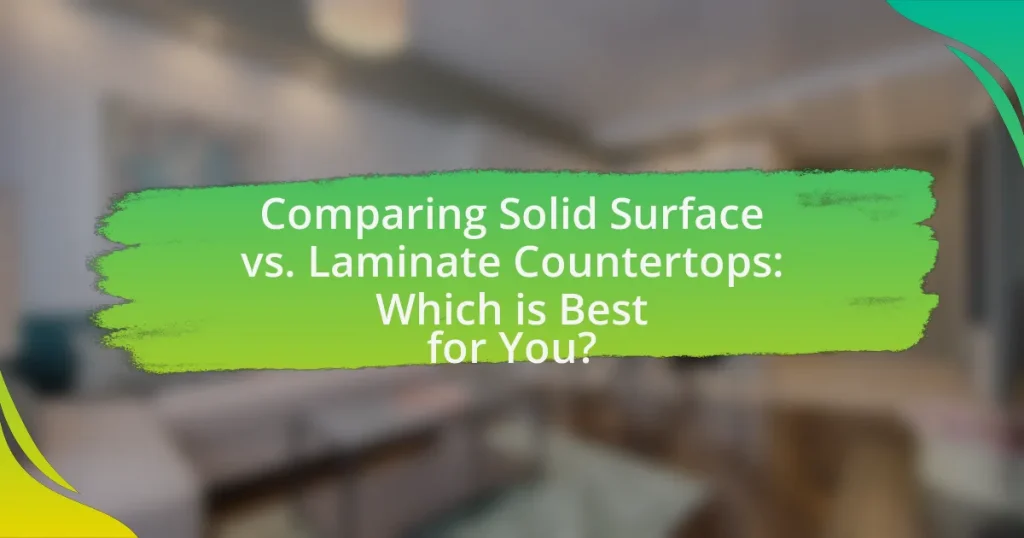Eco-friendly countertop options for sustainable kitchens include materials such as recycled glass, bamboo, reclaimed wood, and quartz made from sustainable resources. These materials contribute to environmental conservation by minimizing waste, reducing resource depletion, and often featuring low-emission manufacturing processes. The article explores the sustainability benefits of these countertops, their impact on indoor air quality, and their durability compared to traditional options. Additionally, it addresses common misconceptions about eco-friendly materials, their costs, and provides guidance on selecting and maintaining these sustainable surfaces for kitchen design.
What are Eco-Friendly Countertop Options for Sustainable Kitchens?

Eco-friendly countertop options for sustainable kitchens include recycled glass, bamboo, reclaimed wood, and quartz made from sustainable materials. Recycled glass countertops are created from post-consumer glass, reducing landfill waste and providing a unique aesthetic. Bamboo is a rapidly renewable resource that offers durability and a modern look. Reclaimed wood countertops utilize salvaged timber, minimizing deforestation and promoting sustainability. Lastly, quartz countertops can be made from up to 90% recycled materials, making them a sustainable choice while providing durability and a variety of design options. These materials not only contribute to environmental conservation but also enhance the aesthetic appeal of kitchens.
How do eco-friendly countertops contribute to sustainability?
Eco-friendly countertops contribute to sustainability by utilizing renewable, recycled, or non-toxic materials that reduce environmental impact. These countertops often incorporate materials like bamboo, recycled glass, or reclaimed wood, which minimize resource depletion and waste. For instance, bamboo grows rapidly and can be harvested sustainably, while recycled glass countertops divert waste from landfills and reduce the need for new raw materials. Additionally, many eco-friendly options are produced using low-emission manufacturing processes, further decreasing their carbon footprint. This combination of sustainable sourcing and production practices makes eco-friendly countertops a viable choice for promoting environmental sustainability in kitchen design.
What materials are commonly used in eco-friendly countertops?
Common materials used in eco-friendly countertops include recycled glass, bamboo, reclaimed wood, and concrete. Recycled glass countertops are made from post-consumer glass, reducing waste and providing a unique aesthetic. Bamboo is a rapidly renewable resource, making it a sustainable choice. Reclaimed wood utilizes salvaged timber, minimizing deforestation and promoting sustainability. Concrete can be made with recycled aggregates and is durable, offering a long-lasting option. These materials collectively contribute to reducing environmental impact while providing functional surfaces for kitchens.
How do these materials impact the environment?
Eco-friendly countertop materials positively impact the environment by reducing waste and minimizing resource depletion. For instance, materials like recycled glass and bamboo are sourced sustainably, which lowers the carbon footprint associated with production. Additionally, using reclaimed wood prevents deforestation and promotes the reuse of existing resources, further conserving energy and reducing landfill waste. Studies indicate that choosing sustainable materials can decrease greenhouse gas emissions by up to 30% compared to traditional options, highlighting their significant environmental benefits.
What are the advantages of choosing eco-friendly countertops?
Choosing eco-friendly countertops offers several advantages, including reduced environmental impact, improved indoor air quality, and enhanced durability. Eco-friendly materials, such as recycled glass, bamboo, or reclaimed wood, minimize resource depletion and waste, contributing to sustainability. Additionally, these countertops often contain fewer harmful chemicals, which helps maintain better air quality in homes. Furthermore, many eco-friendly options are designed to be long-lasting, reducing the need for frequent replacements and thus conserving resources over time.
How do eco-friendly countertops compare to traditional options?
Eco-friendly countertops generally have a lower environmental impact compared to traditional options. Traditional countertops, often made from materials like granite or laminate, can involve extensive mining, chemical processing, and non-renewable resources, contributing to environmental degradation. In contrast, eco-friendly countertops utilize sustainable materials such as recycled glass, bamboo, or reclaimed wood, which reduce waste and promote resource conservation. For instance, recycled glass countertops can divert significant amounts of waste from landfills, while bamboo is a rapidly renewable resource that grows much faster than traditional hardwoods. Additionally, eco-friendly options often have lower VOC emissions, improving indoor air quality.
What health benefits do eco-friendly countertops provide?
Eco-friendly countertops provide several health benefits, primarily by reducing exposure to harmful chemicals. Many eco-friendly materials, such as recycled glass, bamboo, and reclaimed wood, are free from volatile organic compounds (VOCs) that can contribute to indoor air pollution and respiratory issues. For instance, studies have shown that traditional countertops made from synthetic materials often emit VOCs, while eco-friendly alternatives significantly minimize this risk, promoting better air quality in the home. Additionally, these countertops are often treated with non-toxic finishes, further enhancing their safety for household use.
What types of eco-friendly countertop materials are available?

Eco-friendly countertop materials include recycled glass, bamboo, reclaimed wood, and solid surface materials made from natural minerals. Recycled glass countertops are created from post-consumer glass, reducing waste and providing a unique aesthetic. Bamboo is a rapidly renewable resource that offers durability and a modern look. Reclaimed wood utilizes salvaged timber, minimizing deforestation and promoting sustainability. Solid surface materials, often composed of natural minerals and resins, can be manufactured with eco-friendly practices, making them a versatile and sustainable choice. These materials collectively contribute to environmentally responsible kitchen designs.
What are the characteristics of recycled materials used in countertops?
Recycled materials used in countertops are characterized by their sustainability, durability, and aesthetic versatility. These materials often include glass, paper, and plastic that have been repurposed, contributing to waste reduction and environmental conservation. For instance, recycled glass countertops are known for their strength and resistance to heat and scratches, while recycled paper composites offer a unique look and are lightweight yet durable. Additionally, these materials can be produced in various colors and textures, allowing for creative design options that cater to diverse kitchen styles. The use of recycled materials in countertops not only supports eco-friendly practices but also meets the functional demands of modern kitchens.
How is recycled glass used in countertop production?
Recycled glass is used in countertop production by being crushed and mixed with resins or cement to create durable and visually appealing surfaces. This process not only repurposes waste glass, reducing landfill contributions, but also enhances the aesthetic value of countertops with unique colors and patterns derived from the glass fragments. The incorporation of recycled glass in countertops can significantly lower the environmental impact of kitchen renovations, as it utilizes materials that would otherwise be discarded, promoting sustainability in home design.
What are the benefits of using reclaimed wood for countertops?
Using reclaimed wood for countertops offers several benefits, including sustainability, unique aesthetics, and durability. Reclaimed wood is sourced from old buildings, barns, and other structures, which reduces the demand for new lumber and minimizes deforestation. This practice contributes to environmental conservation by repurposing materials that would otherwise go to waste. Additionally, reclaimed wood provides a distinctive look, as each piece carries its own history and character, making countertops visually appealing and one-of-a-kind. Furthermore, reclaimed wood is often more durable than new wood, as it has already weathered years of exposure to the elements, resulting in a denser and more resilient material.
What natural materials are popular for eco-friendly countertops?
Popular natural materials for eco-friendly countertops include bamboo, recycled glass, and reclaimed wood. Bamboo is a rapidly renewable resource, making it a sustainable choice. Recycled glass countertops utilize post-consumer glass, reducing waste and promoting recycling. Reclaimed wood, sourced from old buildings or furniture, minimizes the need for new timber and preserves natural resources. These materials not only contribute to sustainability but also offer unique aesthetics and durability for kitchen environments.
How does bamboo serve as a sustainable countertop option?
Bamboo serves as a sustainable countertop option due to its rapid growth and renewability, making it an environmentally friendly material. Unlike traditional hardwoods that can take decades to mature, bamboo can grow to full height in just three to five years, allowing for quicker harvesting and less deforestation. Additionally, bamboo is a grass, which means it can regenerate after being cut without the need for replanting, further enhancing its sustainability. Studies indicate that bamboo absorbs more carbon dioxide and releases more oxygen than many tree species, contributing positively to the environment. This combination of fast growth, renewability, and ecological benefits makes bamboo a compelling choice for sustainable kitchen countertops.
What are the advantages of using natural stone in sustainable kitchens?
Natural stone offers several advantages in sustainable kitchens, primarily due to its durability, low environmental impact, and aesthetic appeal. The durability of natural stone, such as granite or quartzite, ensures that countertops can withstand wear and tear over time, reducing the need for replacements and minimizing waste. Additionally, natural stone is sourced from the earth, often requiring less energy for extraction and processing compared to synthetic materials, which contributes to a lower carbon footprint. Furthermore, natural stone’s unique beauty enhances the visual appeal of kitchens, promoting a connection to nature and encouraging sustainable design choices.
How can homeowners choose the right eco-friendly countertop?

Homeowners can choose the right eco-friendly countertop by evaluating materials based on sustainability, durability, and maintenance requirements. Sustainable materials include recycled glass, bamboo, and reclaimed wood, which minimize environmental impact. Durability is essential; for instance, quartz and recycled materials often offer long-lasting performance. Maintenance considerations involve assessing how easy the surface is to clean and whether it requires special care. Research indicates that countertops made from recycled materials can reduce waste by up to 70%, supporting eco-friendly choices.
What factors should be considered when selecting an eco-friendly countertop?
When selecting an eco-friendly countertop, consider materials, sustainability, durability, and maintenance. Materials should be sourced from renewable resources or recycled content, such as bamboo or recycled glass, to minimize environmental impact. Sustainability involves assessing the manufacturing processes and the carbon footprint associated with the production of the countertop. Durability is crucial, as longer-lasting materials reduce the need for replacements, thereby conserving resources. Lastly, maintenance requirements should be evaluated, as eco-friendly options often have specific care needs that can affect their longevity and environmental benefits.
How do aesthetics and functionality play a role in the decision-making process?
Aesthetics and functionality significantly influence the decision-making process when selecting eco-friendly countertops for sustainable kitchens. Aesthetics appeal to the visual and emotional aspects of consumers, impacting their perception of beauty and style in kitchen design. For instance, studies show that 75% of homeowners prioritize visual appeal when choosing materials, as attractive surfaces enhance the overall ambiance of the kitchen. Functionality, on the other hand, addresses practical considerations such as durability, maintenance, and usability, which are crucial for everyday kitchen tasks. Research indicates that 80% of consumers consider ease of cleaning and resistance to wear as essential factors in their decision-making. Therefore, the interplay between aesthetics and functionality shapes consumer choices, ensuring that the selected countertops not only look good but also meet practical needs for a sustainable kitchen environment.
What is the importance of durability in eco-friendly countertops?
Durability is crucial in eco-friendly countertops because it ensures longevity and reduces the need for frequent replacements, which can lead to increased waste. High durability in materials like recycled glass, bamboo, or reclaimed wood means that these countertops can withstand daily wear and tear, maintaining their functionality and aesthetic appeal over time. For instance, studies show that durable eco-friendly materials can last up to 50 years, significantly outlasting less sustainable options. This longevity not only supports environmental sustainability by minimizing resource consumption but also provides economic benefits to homeowners through reduced maintenance and replacement costs.
What are some tips for maintaining eco-friendly countertops?
To maintain eco-friendly countertops, regularly clean them with mild, non-toxic cleaners to avoid harmful chemicals. Using a soft cloth or sponge helps prevent scratches and preserves the surface. Additionally, sealing natural stone countertops every few years protects against stains and moisture, extending their lifespan. Avoiding abrasive materials and excessive heat also prevents damage, ensuring the countertops remain functional and visually appealing. Regular maintenance not only enhances durability but also supports the sustainability of the materials used.
How can homeowners ensure the longevity of their eco-friendly countertops?
Homeowners can ensure the longevity of their eco-friendly countertops by regularly cleaning them with non-abrasive, eco-friendly cleaners and avoiding harsh chemicals. Regular maintenance prevents the buildup of grime and damage that can shorten the lifespan of the materials. For instance, using a soft cloth and mild soap can effectively remove stains without harming the surface. Additionally, homeowners should apply sealants as recommended by the manufacturer to protect porous materials from moisture and staining, which is crucial for materials like bamboo or recycled glass. Following these practices can significantly extend the life of eco-friendly countertops, as studies indicate that proper care can increase the durability of natural materials by up to 50%.
What cleaning products are safe for eco-friendly countertop materials?
Safe cleaning products for eco-friendly countertop materials include vinegar, baking soda, and mild dish soap. These products are non-toxic and biodegradable, making them suitable for surfaces like bamboo, recycled glass, and quartz. Vinegar effectively disinfects and removes stains without harsh chemicals, while baking soda acts as a gentle abrasive for scrubbing. Mild dish soap mixed with water provides a safe solution for regular cleaning. These alternatives ensure the longevity of eco-friendly materials while minimizing environmental impact.
What are common misconceptions about eco-friendly countertops?
Common misconceptions about eco-friendly countertops include the belief that they are always more expensive, less durable, and limited in design options. While some eco-friendly materials can be pricier upfront, many options, such as recycled glass or bamboo, can be competitively priced and offer long-term savings due to their durability and low maintenance. Additionally, eco-friendly countertops, like those made from quartz or recycled materials, can be just as durable as traditional options, often exceeding their lifespan. Furthermore, the variety of designs available in eco-friendly materials has expanded significantly, allowing for a wide range of aesthetics that can suit any kitchen style.
How do costs of eco-friendly countertops compare to traditional options?
Eco-friendly countertops generally have higher upfront costs compared to traditional options. For instance, materials like recycled glass or bamboo can range from $50 to $150 per square foot, while traditional materials such as laminate or basic granite typically cost between $20 and $100 per square foot. This price difference is often attributed to the sustainable sourcing and manufacturing processes involved in eco-friendly materials, which can be more labor-intensive and require specialized production techniques.
What are the myths surrounding the performance of eco-friendly materials?
Myths surrounding the performance of eco-friendly materials include the belief that they are less durable and effective than traditional materials. Many people assume that eco-friendly options, such as bamboo or recycled glass, cannot withstand the same wear and tear as conventional materials like granite or laminate. However, studies show that many eco-friendly materials are engineered to meet or exceed the performance standards of their non-eco counterparts. For instance, a study published in the Journal of Cleaner Production found that recycled materials can offer comparable strength and longevity, debunking the myth of inferior durability. Additionally, eco-friendly materials often have lower environmental impacts without sacrificing performance, making them a viable choice for sustainable kitchens.



